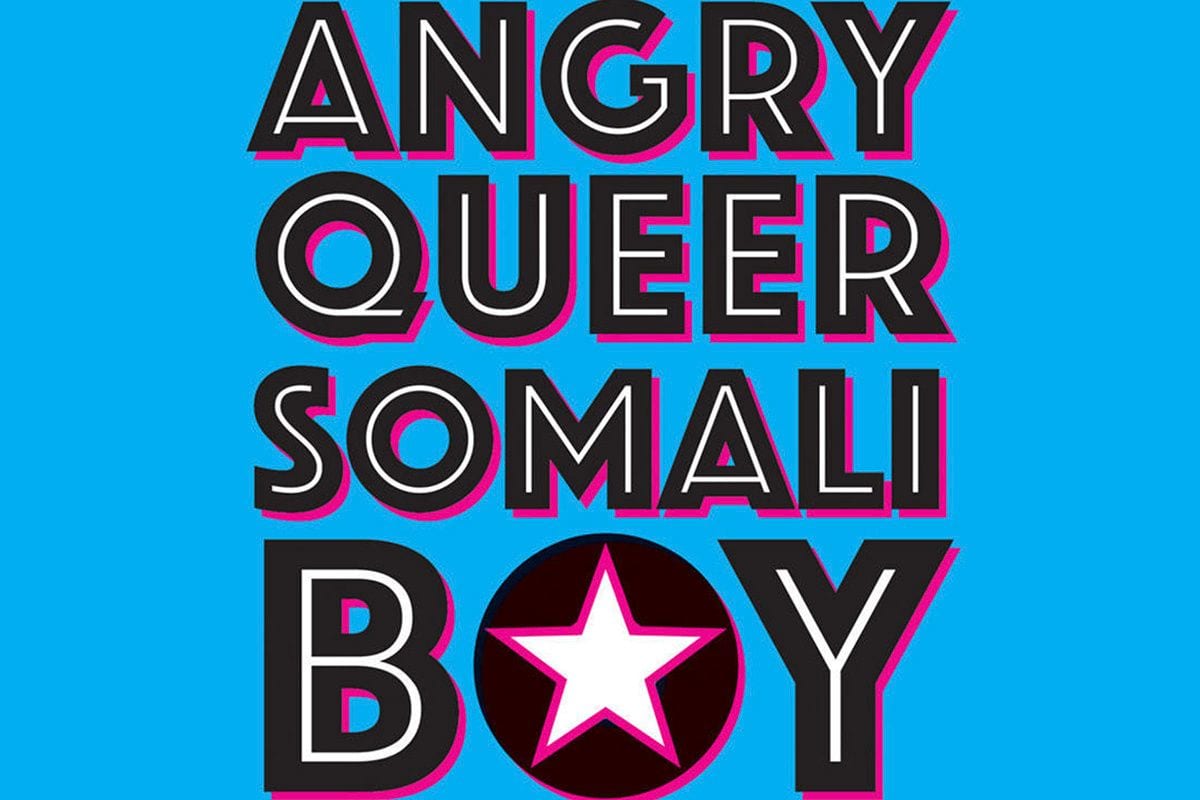
It’s common, in the wake of decadent Thanksgiving meals designed to make settler Americans feel the full gustatory scale of their disproportionately indulgent lifestyles, to drift into a soporific daze, muttering through closed eyelids about a ‘turkey hangover’.
It’s an apt metaphor for the broader and more pervasive ‘colonialism hangover’ which seems to also induce stupor-like effects, only on a year-round basis.
If anything will wake white folk up out of their stupor, it’s Angry Queer Somali Boy. The “complicated memoir” of Mohamed Abdulkarim Ali strikes with unexpected and relentless power. It’s a story of racism, colonialism, homophobia, drug and alcohol addiction, and abuse of every kind imaginable. Ali’s father sent him out of Somalia when he was a young child to live with his abusive stepmother in The Netherlands.
His father thought he was rescuing him from the violence of the civil war which gripped Somalia at the time, but it turns out he was simply substituting one form of hell for another. The racist indifference of Dutch officialdom to the needs of refugee families, coupled with the abusive family situation into which Ali was thrust, both contributed to the anger which pervaded his life from an early age.
“With violence, its victims become its best practitioners,” he relates.
His realization that he was gay was equally fraught; without a supportive home or school environment, or role models or mentors, he experienced further layers of alienation and abuse.
“It was assumed we had the wherewithal to pick up where we left off,” Ali writes. “The rage of becoming dependents and the obscuring of our pain taxed our collective sanity. Violence was the expression of our frustrations. We were a proud people brought low by historical circumstance. No one had the time to figure out what went wrong because life had to go on. We had to thrive in this alien land and jealously guard whatever we had left of our culture. The Dutch, meanwhile, believed that the absence of violence, a Western education, and submersion in Occidental culture healed any spiritual kinks.”
While still a teenager his family relocated to Toronto, Canada, but this merely substituted one form of racist society for another. Ali educated himself, finding his own mentors in school and college libraries: Frantz Fanon, Lenin, James Baldwin, Richard Wright. The burning resilience of the human mind is demonstrated in its fullest capacity by this memoir; despite the brutal and adverse circumstances in which he grew up, Ali sought out and taught himself the theories and tools that enabled him to analyze with profound precision the intersecting layers of colonialism, class struggle, and racism that shaped the city in which he lived.
Ali’s prose is masterful. He can trade in both graphic, cringe-worthy description, as well as humorous and insightful wit of the first order. The latter is most in evidence in his wry descriptions of adjusting to life in Canada.
“Unlike in the Netherlands, public transit was lacking…We used to get on our bikes, but one can’t ride a bike with certainty in Toronto. Not even pedestrians were safe from drivers. What made drivers so upset? In Canada, the water was clean, every other business had a drive-through, and they controlled most of the built streetscape, yet they were full of rage.
“My first summer in Toronto was sweltering. The Petro-Canada at Sentinel Road and Finch Avenue West showed gas was going for forty-eight cents a litre, an astoundingly low price compared to the cost of fuel in Europe. Milk came in plastic bags and the aisles of the grocery stores had melted cheese in jars.”
“‘You speak English so well!,'” Ali recalls his first Canadian school principal telling him as she gave him a tour of his new school. “Her smile was unsettling. Its permanence bordered on the plastic. I didn’t realize it then, but smiling was something of a pastime in this country. Smiling in the Netherlands was akin to a crime.”
Somali immigrants, housed in the poorer areas on the outskirts of Toronto, found themselves caught in a web of conflicting ethnic tensions. Ali’s family urged him to stay away from “Black” teenage gangs; the tension between Caribbean, West Indian, African and Black Canadian residents was palpable, delineating multiple forms of racism, all inflected by the broader and more destructive racism of white Canada and its institutions against any form of otherness.
“I was more concerned about the police than the criminals or gun violence. They rode up and down the neighbourhood and made their presence felt. Toronto’s motto is diversity is our strength. What is more diverse than black flesh on a police baton! Diversity was a lovely sideshow to distract us from the mouldy walls in the buildings. There was nothing diverse about books falling apart in neighbourhood schools or seeing young men stopped and carded. Diversity was a ploy to gloss over the obscene disparities in this supposed just and free society.”
Angry Queer Somali Boy is a harrowing read, a blunt hammer of a book which holds nothing back in its graphic depiction of racist violence and sexual abuse. It would be easy to feel a combination of deep pity and profound respect for its author, but a more appropriate emotion to feel would be shame on behalf of the society which makes such stories possible; and even worse, common. It’s a harrowing read, but a vitally important one.
If white folks wish to be woken from their stupor and understand the ways in which their societies cultivate the sustained ruin of the lives of non-white refugees and immigrants, this book will do it. It’s a masterpiece of memoir, but also a cultural critique of the first order. Ali’s is an angry, queer Somali voice that has a great deal of important things to say and says them in wise, compelling prose. It is a voice that North America urgently needs to hear.

